- Home
- Alison McGhee
All Rivers Flow to the Sea Page 3
All Rivers Flow to the Sea Read online
Page 3
“Except for offshore water bats,” William T. says. “Do you give up?”
She nods. Every day, Angel gives up.
“The bird of the day,” William T. says, “is a deep-water petrel.”
She nods appreciatively, just as she does every day, and turns back to Ivy. She rubs Ivy’s feet. She smoothes Ivy’s hair off her forehead. Ivy’s face is beautiful. Perfect. You would never know to look at her how badly hurt the inside of her head is. Angel touches Ivy’s cheek, and then she turns to go. William T. salutes her as if he’s a soldier and she, his commanding officer. That’s the last part of their ritual. She smiles at him.
“At ease, William T.,” Angel says, and the door closes behind her.
Ivy and I had an accident. It was dusk in the Adirondacks that night, and we were coming around a curve. And Ivy pumped the brakes, but a light blue truck was going too fast, and it came sliding into us.
It’s still happening.
Some mornings I wake and the sun glimmers over the pines across the road, and it’s another day, and I love the days, I love waking up, but something’s wrong — something’s wrong — something —
Oh.
The accident won’t stop happening. Over and over it happens, and I would give anything to have my sister back.
You would? I hear Ivy saying. What, exactly, would you give up, Rosie?
My sister knew how much the idea of sacrifice intrigues me. Stories of the martyrs and saints. I used to like to put myself through periods of austerity. Giving up hot water when showering. Dessert for Lent. Extra sleep on school vacation days, my electric blanket on cold winter nights.
“I’m testing myself,” I used to tell Ivy. “Good preparation for life’s future hurdles.”
When we were little, I dragged a few of William T.’s old truck tires into the woods and laid them one in front of the other.
“This is an obstacle course,” I told Ivy. “In order to get the highest rating, you must leap from the center of one tire to the center of the next tire, never slowing, never stopping. Points will be taken off if I detect a look of tiredness on your face.”
But Ivy wouldn’t play.
“You are such a weirdo,” she said.
I used to do my obstacle course by myself. Ivy stood by the side laughing at me.
“Yikes!” she would say. “Do I detect a look of tiredness on your face? Indeed, I do. One point off.”
Ivy didn’t like to sacrifice. She didn’t believe in it.
“Life is short, little sister,” she said. “Take advantage.”
Sometimes I would wake in the night to the sound of hail. Joe Miller, Ivy’s boyfriend, standing in the darkness, tossing pebbles at Ivy’s window. And Ivy would go with him, jumping into his truck that idled by the side of the road, lights off.
Joe Miller was not a welcome presence at Sterns High. Teachers were glad to see him go when he graduated last year. Now he works at Gray’s Automotive in Remsen, with all the other Millers. He used to roar down Jones Hill after work, steer fast into the driveway so that bits of gravel spewed from under his tires, and come swinging down from the driver’s seat, the truck still running, and bound up the steps to the kitchen door. Knock, knock. “Hey, Mrs. Latham. Hey there, Rose. What’s on the sacrifice menu today?”
Like my mother, Joe Miller has not been to see Ivy since they moved her from the hospital to the Rosewood Convalescent Home.
You could almost see something in the air between Ivy and Joe. Something in Joe Miller’s body, and something in Ivy’s, drew them to each other. Maybe they knew each other in a former life. Maybe they walked a dusty road together, a dusty road in the desert, and they held hands, and when they stopped to rest, maybe Joe-in-the-former-life held Ivy’s foot between his hands and rubbed the tiredness out of her muscles while they talked softly between themselves. It’s possible. “Anything’s possible,” said Angel. “Except for offshore water bats,” said William T.
I can hear Ivy now.
What, exactly, would you give up to get me back, Miss Sacrifice? Be specific.
Is there anything I would not give up?
Ivy was behind the wheel, and I was next to her. We rounded the curve. We saw the truck. The boy’s light blue truck. Ivy pumped the brakes. The truck slid gently into our car.
And that was my moment, my moment when time tilted, plucked me up, and set me down again here, in this unimagined place.
“Your sister can’t hear you,” the doctor said. “She has no vestibulo-ocular reflex.”
But there’s more to this world than meets the eye, isn’t there? That same doctor might say to a man whose leg is missing: “Your leg’s not there anymore. It can’t hurt you.” It does, though. Ever heard of phantom pain, Mr. Smart-doctor-who-thinks-he-knows-everything-but-doesn’t?
Would you give up sugar to get me back, Rosie? You know you love sugar.
Of course I would give up sugar, Ivy.
Easily. No candy bars, sourballs, oatmeal butterscotch cookies, Boston cream pie, or carrot cake with cream cheese frosting. No chocolate either. No maple syrup or honey. Cough drops even. Goodbye to you, sugar. Goodbye and good riddance. A sacrifice, but enough of a sacrifice?
No. You can’t get me back that easily. What else?
Bike riding. I would give up bike riding for you, Ivy.
No more riding down Jones Hill, no more wind blowing back my hair, no more crisscrossing Route 274 after the sun’s gone down and it’s just me and the stars in the dark night sky. No more wishhh of tires on pavement, no more looking back once to make sure that the kitchen light’s still on before I forge on up the road, the moon ever brighter, the air ever cooler. Goodbye to bike riding.
A sacrifice, but not enough of a sacrifice. Aren’t I worth more than that? Come on. What else?
Driving. I would give up driving to get you back, Ivy.
Ha! That’s not a sacrifice! You don’t even know how to drive.
The people of Pompeii never had to learn to drive. They never came around a curve in the road one night in March, in the hills where they lived, to find a light blue truck sliding toward them, coming straight at them. Somebody from Gray’s Automotive, someone who wasn’t Joe Miller, towed our car away from the accident and took it down to Utica, where they crushed it into a lump of scrap metal.
Ivy is right; I don’t drive. Why not?
Because.
Because Ivy and I had an accident. It was the end of winter, dusk in the Adirondacks, and we came around a curve. And then Ivy wasn’t moving, and she wasn’t answering, and was she breathing? Blood. My window was broken and I broke it more. I punched it with my jacket wrapped around my hand, punched and punched, and I crawled out and fell up. We were upside down? How had that happened? I ran. I ran, and ran, and ran, and ran, pavement and patchy March ice, until I came to the cabin on Deeper Lake where Tom Miller lives with his grandfather Spooner.
“Hello?”
Tom’s voice.
I tried to scream but there was only a wheeze, a whisper. I staggered up Tom’s sand driveway, and Tom was standing there with a bucket of water and a flashlight.
“Rose?”
Light, shining in my face. Blinding me. It swung crazily away and Tom was yelling.
“Grampa! She’s bleeding!”
His grandfather, old Spooner, came bursting from the cabin, a red dish towel clutched in his hand. I saw the truck and I was on it, tugging at its rusted door, trying to yank it open.
“What’s going on?” Spooner said. “She’s bleeding. Who is she?”
“Rose Latham,” Tom said.
I was in the truck and turning the key, and there was a scraping sound — metal on metal, a hurting scraping sound — and Spooner yelled.
“It’s a stick! Push the clutch in!”
But I didn’t know how to drive.
Then they were both in the truck with me, Tom riding on the hump and me crawling over him so Spooner could put it in reverse, wheel around, and head down their long
curving sand driveway to 274.
“We had an accident,” I said. “We were coming around a curve. Ivy’s still in there.”
Spooner behind the wheel was making the truck fly like it couldn’t ordinarily do. I could tell from the shuddering and shaking. The whole side of my face was pressed into the glass, my body rocking forward and back as if I were part of the truck, part of what made us swoop around the curves that led into the mountains from the foothills. My ears popped. Someone was saying something to me, but I was gone into another world, a world of rocking with my back and hips, a world of forcing the truck forward with my palms flattened on the glass.
All it takes is a single moment. Think about your own life. Something happened once — a door opened the wrong way, maybe, or an expression you never saw before appeared on the face of your father, or your dog ran toward the road, or your mother raised her hand, or a black bird hovered high in the sky above you — and suddenly you’re running, you’re running in the foothills, running for help, and you can’t get your breath, and you can’t get your breath, and you can’t — get your breath — and you can’t — get — your — breath —
Jimmy Wilson sits a few seats up, next to Warren Graves. All of us are silent, staring out at the green, all the shades of green that are an Adirondacks May in North Sterns. Jimmy’s whole body is rigid with his not-looking at me. I look at his rigid not-looking-at-Rose-Latham head and I remember the way his body went rigid for a second up at the gorge, and the way he looked at me the next day at my locker. I don’t want to think about Jimmy Wilson, but there he is with his head not turning around, and that head of his is all I can see.
Then Warren stands up. You aren’t supposed to stand up while the bus is in motion, and you’re supposed to stay behind the line when the bus is in motion, and you aren’t supposed to walk down the aisle, all the way back to where I’m sitting, alone and trapped on my green vinyl seat, and you aren’t supposed to slide into the seat next to me, slide so close that your leg is touching my leg, is pressing against my thigh, and you aren’t supposed to stare at me like this, the way that Warren’s staring at me.
He doesn’t blink.
I feel his stare. I feel the others staring. They sit rigid in their seats and some of their heads are pressing together and some of their mouths are moving, are whispering, are talking about Ivy Latham. Ivy who would not be in a wheelchair, Ivy who can’t breathe, who’s a human vegetable. I listen intently so that I’ll know who’s saying what, so that I can push my way past the staring Warren and set them straight about my sister.
But they’re not talking about Ivy. They’re talking about me, Rose Latham, Rose and Jimmy. Who knew, who knew, who knew, who would ever have thought — I mean, Rose? Rose Latham?
“Isn’t that right, Wilson?” Warren calls, as if he’s said something to Jimmy, which he hasn’t.
Way up near the front of the bus, Jimmy Wilson doesn’t turn around.
“Isn’t that RIGHT?” Warren calls again.
I zero in on Warren, next to me. I can feel his thoughts. He thinks he has the right — he can stare at me all he wants, he can press his leg against mine as hard, hard, hard as he wants, and I won’t protest. He thinks he has something on me and that I won’t say anything. He thinks I’m ashamed.
Wrong.
He and the hall-talkers and the bus-talkers are wrong. They think they know what happened up at the gorge with me and Jimmy, but they don’t. They don’t know that sometimes the world should stop for a while, but it doesn’t. Jimmy Wilson’s body on mine hurt — it hurt — but it was a different kind of hurt from the hurt that comes from Ivy lying on that bed and not waking up.
“Right, Wilson? Rose is going to skip some stones with me at the gorge tonight.”
Jimmy’s head stays rigid.
“Sure,” I say. “Sounds like fun.”
For just a second, Warren looks surprised. Then he recovers.
“Okay, Rosie. See you later, then.”
Rosie. That, I was not prepared for. That, I had no defense against. My sister, Ivy, was the only one who called me Rosie.
“What time, Rosie?”
I stand up and push past him, push past his legs that are blocking my way. Down the aisle I go. Can’t see. Can’t see. Behind me I hear Warren saying, “What? What? What did I say, Rosie?” Do not call me Rosie. I’m trying to keep my balance with my hand, seat to seat. Down the aisle I go until I come to Katie and I can’t go any farther, and I sit down in front of the stay-behind-the-line-when-the-bus-is-in-motion. On the floor next to Katie, my legs braced against the steps that lead down and out.
“Hey!” Katie says. “You can’t sit here. Get the hell back there and sit your butt down.”
Can’t see. Can’t see.
“NOW.”
Back I go. Behind the line I go, while the bus is in motion. There’s an empty seat. Drop into it. No, this is Jimmy Wilson’s seat. Too late. Jimmy doesn’t look at me. His head stays rigid. Behind us, Warren.
“What? What? What did I say? Geez!”
And then we’re at my house, and Katie chuffs off in a cloud of tired blue exhaust. I’m inside my house, my house where my sister isn’t. It’s happening again, isn’t it, Rosie? Come on — let’s walk.
“All Millers go through crazy,” William T. says when I tell him how Tom broke my lock for me.
“They aren’t meant to stay in school,” he says. “You can see it in them from kindergarten on. Millers go through crazy and a bunch of them stay there.”
Crazy. As if it were a geographical location. A place that’s on the way to another place, a stopover on a trip, a town, or a tourist destination, Crazy with a capital C.
“Tom Miller’s not crazy,” I say.
William T. considers. I can see him turning Millers over in his mind, beginning with Joe and moving on to Greg and Tubes and Shorty and ending with Spooner. No, I can see him thinking, Spooner’s not crazy, at least not in a Miller way — and Tom, being Spooner’s grandson, might well not be crazy, either, at least not in that Miller way.
“You might be right, Younger,” he says after a while. “Tom Miller might be the Miller exception who proves the Miller rule.”
I once watched Tom Miller in the school hallway, like a beautiful young horse, muscle and thirst, bend over the drinking fountain and drink. He drank and drank and drank, as if he could never get enough.
“Tom’s father was crazy, though,” William T. says. “Even before the war, Chase Miller was a little bit crazy.”
Chase Miller had gone to Vietnam, to the jungle. Vietnam is the next war in our book of wars. When I try to picture the jungle there, I see color: green of trees, brown of bark, plants growing to the heavens because there’s no end to the sun and the rain and the warmth. Neon parrots squawking in the trees, snakes coiled around tree limbs. As far away from here as I can imagine a place being.
“That goddamned war did Chase in,” William T. says.
I don’t say, You owe me a quarter, William T.
Chase died of cirrhosis before Tom was born, and Tom’s mother couldn’t take it and she left him with Spooner.
“She moved to Canada,” William T. told me once. “To get away from the sickness of America, she said.”
Tom’s always lived with his grandfather Spooner, in their log cabin on Deeper Lake. No electricity. No running water. You can walk to Deeper Lake from my house. You can walk anywhere in the world from my house. You might have to cross uncharted mountains, you might have to walk underwater for thousands of miles to get across the ocean, but, if you are determined enough, you can walk anywhere in the world from my house. You can walk to the jungles of Vietnam and lose yourself there.
I open the blinds and let the sunlight into Ivy’s room. May air is soft and sweet through the screened window. William T. sits in his blue chair, reading his bird book and expanding his knowledge of the birds of America. If Ivy and I hadn’t had our accident, William T. would be helping his girlfriend, Crystal, close
her diner for the night. Right about now, Crystal is scraping down the grill. If William T. were at Crystal’s Diner, he would be wiping down each of the red counter stools in turn. Then he would turn to the booths and scrub each wooden tabletop and each red vinyl seat. By the time he was finished, Crystal would be finished prepping for tomorrow morning’s breakfast. They would leave together and get into Crystal’s truck or William T.’s truck, whoever had driven that day. Before the accident, I sometimes used to help them. Fill the sugar containers. Fill the salt and pepper shakers. Make sure there was plenty of ketchup in the ketchup bottles. Lots of people like ketchup with their eggs, did you know that? I didn’t, before I used to help out Crystal and William T.
Now William T. spends his afternoons in the blue chair, putting his time to good use while I read to Ivy.
Angel comes in on her silent sneakered feet. Her angel pin is at her waist today, a small change of pace.
“Angel, I have a question for you.”
“And what is your question, William T.?”
“It’s a concentration camp question.”
Angel doesn’t miss a beat. She never misses a beat. She’s like Crystal that way, takes William T. just as he is, concentration camp question and all.
“You’re in a concentration camp being given your ration for the day,” William T. says. “Three pieces of bread and one pat of butter.”
“Butter in a concentration camp, William T.? I think you’ve got your history wrong.”
“Don’t be so literal, Angel. Use your imagination. Your ration for the day is three pieces of bread and one small pat of butter.”
“And?”
“And, how do you eat the butter? Do you (a) spread it thickly on one piece of bread and eat the other two plain?, (b) spread it on all three pieces, evenly but so thinly that you can barely taste it?, or (c) save the small pat of butter and add it to the other days’ small pieces of butter until the end of the week, so that you can have three pieces of bread all spread very thickly with butter?”
Angel tilts her head, considering the possibilities of butter and bread in the concentration camp. Deep in thought.

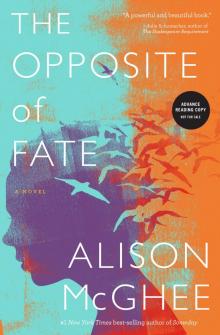 The Opposite of Fate (ARC)
The Opposite of Fate (ARC)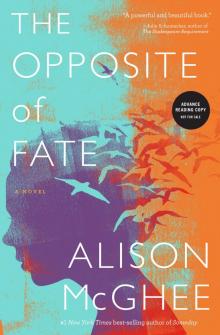 The Opposite of Fate
The Opposite of Fate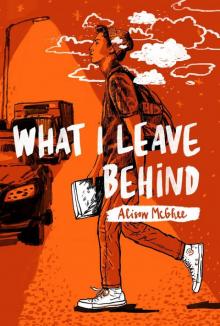 What I Leave Behind
What I Leave Behind Shadow Baby
Shadow Baby All Rivers Flow to the Sea
All Rivers Flow to the Sea Was It Beautiful?
Was It Beautiful? Firefly Hollow
Firefly Hollow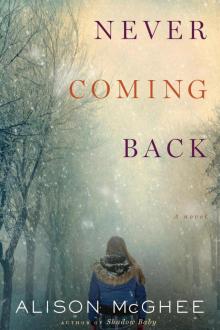 Never Coming Back
Never Coming Back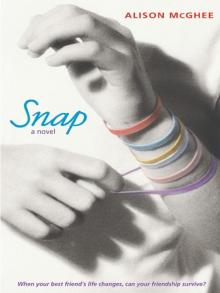 Snap
Snap Pablo and Birdy
Pablo and Birdy